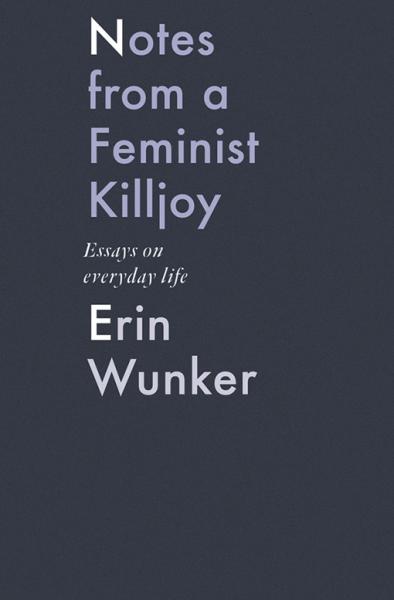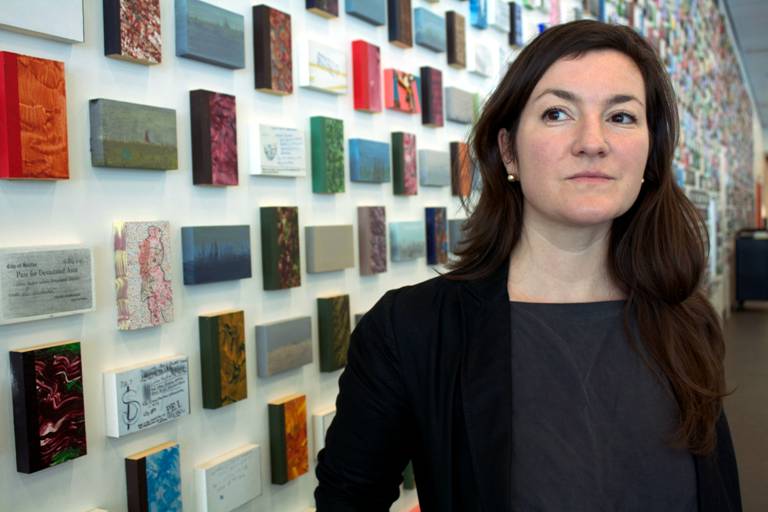Erin Wunker is Chair of the Board of the national non-profit organization Canadian Women in the Literary Arts, a teacher of Canadian Literature and cultural production, as well as co-founder, writer, and managing editor of the feminist blog Hook & Eye: Fast Feminism, Slow Academe. Room’s Geffen Semach spoke to Erin Wunker about her new book, the act of refusal, self-care, and what it means to take on the figure of the feminist killjoy.
Erin Wunker is Chair of the Board of the national non-profit organization Canadian Women in the Literary Arts, a teacher of Canadian Literature and cultural production, as well as co-founder, writer, and managing editor of the feminist blog Hook & Eye: Fast Feminism, Slow Academe.
In Notes from a Feminist Killjoy: Essays on Everyday Life, Erin Wunker tackles the part feminism plays in modern culture, friendships, and motherhood. Central to Wunker’s debut book of essays is the need for the feminist killjoy. Notes from a Feminist Killjoy is now available for purchases from BookThug.
Room’s Geffen Semach spoke to Erin Wunker about her new book, the act of refusal, self-care, and what it means to take on the figure of the feminist killjoy.
Geffen Semach (GS): Notes from a Feminist Killjoy began in its infancy as a handbook, and transformed beyond that shape and to something far more complicated. Why did you decide you needed to write a “handbook-not-handbook” at this point?
Erin Wunker (EW): I realized two things—first, that my publishers didn’t necessarily require/want me to write a handbook (phew) and second, that I was not the one to be writing a handbook at that time. While I respect and even at times aspire to the streamline step-by-step structure of a how-to manual I tend to get stuck in and invested in the grey areas of issues. Moreover, the material conditions of writing this book (with an infant, with my partner and I both working full-time teaching in post-secondary settings, with hardly any childcare) shaped the format. Essays as vignettes, as notes, became the way I could write at all.
GS: What do you hope anyone who reads Notes from a Feminist Killjoy will take away, regardless of any background different than your own?
EW: I hope that readers feel invited into a conversation. I hope they feel heard and seen even though we are just thinking together on paper. I hope that if they are looking for language to articulate some of the repressive structures that shape our relatings to one another that maybe I helped them find some language (even—especially—if it comes from a rejection of the terms I use). I hope that my wager of vulnerability opens a space for respectful dialogue.
GS: The sequence of essays appears in the book as follows: Rape Culture, Friendships, and Feminist Mothering. I am curious what the significance of this structure was to you in writing the book.
 EW: What a great question, thank you. I wrote the chapter on rape culture first—and it was initially twice as long as it is in the published book. After I finished a full draft I set it to the side—I needed to step away from it, to take time to think about other modes of feminist killjoy work. And so, feeling tired and lonesome, I thought what sustains me? And the answer was, in part, friendship. So I turned to that. The final chapter on feminist mothering is very much an attempt to think through a topic form my own situation—to focus in on a small point (me) and use that to think more widely about mothering and feminisms.
EW: What a great question, thank you. I wrote the chapter on rape culture first—and it was initially twice as long as it is in the published book. After I finished a full draft I set it to the side—I needed to step away from it, to take time to think about other modes of feminist killjoy work. And so, feeling tired and lonesome, I thought what sustains me? And the answer was, in part, friendship. So I turned to that. The final chapter on feminist mothering is very much an attempt to think through a topic form my own situation—to focus in on a small point (me) and use that to think more widely about mothering and feminisms.
GS: You reference a range of sources in your essays, including Sara Ahmed’s blog, Feminist Killjoys being a key inspiration for you. Are there any other pieces of writing you would particularly recommend to our readers on the subject of the feminist killjoy?
EW: Oh gosh yes. Work by Liz Howard, Sonnet L’Abbè, Sachiko Murakami, Vivek Shraya, Amber Dawn, El Jones, Shannon Webb-Campbell, Hannah MacGregor, Lucia Lorenzi, Dionne Brand, Sina Queyras, NourbeSe Philip, Zoe Whittall, Lucas Crawford . . . I could go on and on.
GS: In Postscript: Sometimes Refusal is a Feminist Act, you quote Sara Ahmed as follows—“I will not reproduce a world I cannot bear, a world I do not think should be borne.” Recent events in the United States have many of us shaken, in what sense is the act of refusal applicable in order to move in the right direction?
EW: I think that refusal to accept total despair is necessary. We need to move through the process of grief in this case, but not get stuck in the so-called last step of acceptance. We need to grieve, make room for those ambivalent feelings, and then work to form real alliances to keep one another strong for the next set of struggles.
GS: Self-care and tenderness with one’s own self are some common themes that surface again and again in your book. How does showing compassion to the body and the mind fit into the idea of the feminist killjoy in your eyes?
EW: So much of the world we live in here in North America teaches women, WOC, POC, trans, queer, two-spirited, and differently abled people that their bodies and minds aren’t worth caring for, that they aren’t enough. These are narratives we are born into. They seep into our skin. Learning and fighting for compassion towards one’s self is, I think (& I’m drawing on Sara Ahmed reading Audre Lorde here) a radical act.
GS: Notes from a Feminist Killjoy felt very much like an open-armed embrace. Is there a wish you would like to leave our readers?
EW: That if we meet each other we do so from places of respect and warmth, or at least openness and possibility.














